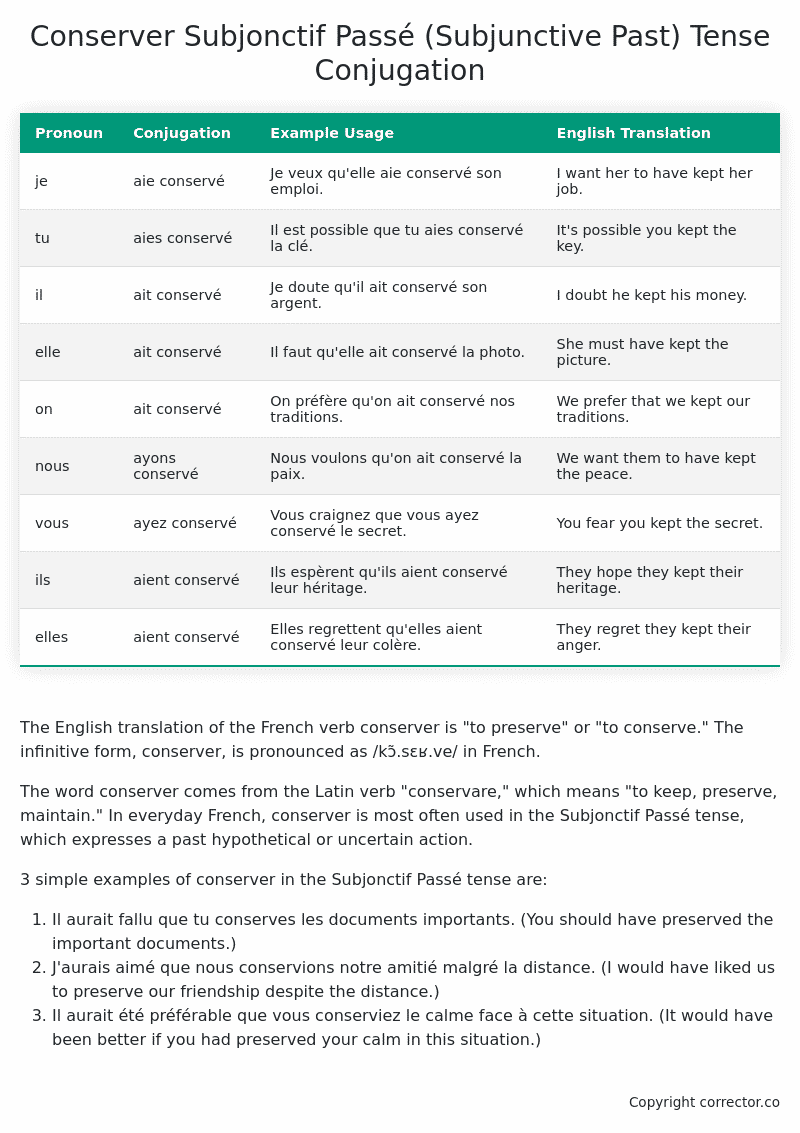Subjonctif Passé (Subjunctive Past) Tense Conjugation of the French Verb conserver
Introduction to the verb conserver
The English translation of the French verb conserver is “to preserve” or “to conserve.” The infinitive form, conserver, is pronounced as /kɔ̃.sɛʁ.ve/ in French.
The word conserver comes from the Latin verb “conservare,” which means “to keep, preserve, maintain.” In everyday French, conserver is most often used in the Subjonctif Passé tense, which expresses a past hypothetical or uncertain action.
3 simple examples of conserver in the Subjonctif Passé tense are:
- Il aurait fallu que tu conserves les documents importants. (You should have preserved the important documents.)
- J’aurais aimé que nous conservions notre amitié malgré la distance. (I would have liked us to preserve our friendship despite the distance.)
- Il aurait été préférable que vous conserviez le calme face à cette situation. (It would have been better if you had preserved your calm in this situation.)
Table of the Subjonctif Passé (Subjunctive Past) Tense Conjugation of conserver
| Pronoun | Conjugation | Example Usage | English Translation |
|---|---|---|---|
| je | aie conservé | Je veux qu’elle aie conservé son emploi. | I want her to have kept her job. |
| tu | aies conservé | Il est possible que tu aies conservé la clé. | It’s possible you kept the key. |
| il | ait conservé | Je doute qu’il ait conservé son argent. | I doubt he kept his money. |
| elle | ait conservé | Il faut qu’elle ait conservé la photo. | She must have kept the picture. |
| on | ait conservé | On préfère qu’on ait conservé nos traditions. | We prefer that we kept our traditions. |
| nous | ayons conservé | Nous voulons qu’on ait conservé la paix. | We want them to have kept the peace. |
| vous | ayez conservé | Vous craignez que vous ayez conservé le secret. | You fear you kept the secret. |
| ils | aient conservé | Ils espèrent qu’ils aient conservé leur héritage. | They hope they kept their heritage. |
| elles | aient conservé | Elles regrettent qu’elles aient conservé leur colère. | They regret they kept their anger. |
Other Conjugations for Conserver.
Le Present (Present Tense) Conjugation of the French Verb conserver
Imparfait (Imperfect) Tense Conjugation of the French Verb conserver
Passé Simple (Simple Past) Tense Conjugation of the French Verb conserver
Passé Composé (Present Perfect) Tense Conjugation of the French Verb conserver
Futur Simple (Simple Future) Tense Conjugation of the French Verb conserver
Futur Proche (Near Future) Tense Conjugation of the French Verb conserver
Plus-que-parfait (Pluperfect) Tense Conjugation of the French Verb conserver
Passé Antérieur (Past Anterior) Tense Conjugation of the French Verb conserver
Futur Antérieur (Future Anterior) Tense Conjugation of the French Verb conserver
Subjonctif Présent (Subjunctive Present) Tense Conjugation of the French Verb conserver
Subjonctif Passé (Subjunctive Past) Tense Conjugation of the French Verb conserver (this article)
Subjonctif Imparfait (Subjunctive Imperfect) Tense Conjugation of the French Verb conserver
Subjonctif Plus-que-parfait (Subjunctive Pluperfect) Tense Conjugation of the French Verb conserver
Conditionnel Présent (Conditional Present) Tense Conjugation of the French Verb conserver
Conditionnel Passé (Conditional Past) Tense Conjugation of the French Verb conserver
L’impératif Présent (Imperative Present) Tense Conjugation of the French Verb conserver
L’infinitif Présent (Infinitive Present) Tense Conjugation of the French Verb conserver
Struggling with French verbs or the language in general? Why not use our free French Grammar Checker – no registration required!
Get a FREE Download Study Sheet of this Conjugation 🔥
Simply right click the image below, click “save image” and get your free reference for the conserver Subjonctif Passé tense conjugation!

Conserver – About the French Subjonctif Passé (Subjunctive Past) Tense
Formation of the Subjonctif Passé
Everyday Usage Patterns
Interactions with Other Tenses
Present tense
Future tense
Conditional
Summary
I hope you enjoyed this article on the verb conserver. Still in a learning mood? Check out another TOTALLY random French verb conjugation!


